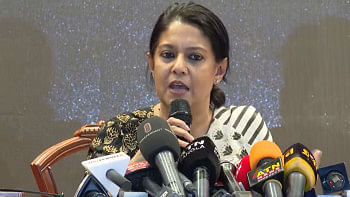For Rohingyas, Bhashan Char is a chance at a better life

The recent signing of an MOU between the Bangladesh government and the United Nations High Commissioner for Refugees (UNHCR), affirming the latter's willingness to help in the ongoing relocation of Rohingyas to Bhashan Char, is welcome news—albeit a couple of years delayed.
For more than two years, the Bangladesh government, wisely, has been talking about relocating the Rohingyas—at least a segment of them—from the squalid, unhygienic, unsafe, and severely overpopulated camps located in Cox's Bazar's Teknaf and Kutupalong areas, to the much healthier and habitable island of Bhashan Char. The aim was to ensure a better quality of life for this group of people, who are victims of mass persecution and ethnic cleansing in their own homeland—Myanmar. It took a while for the Bangladesh government to put the necessary infrastructure in place, which included constructing houses of better quality, putting healthcare facilities in place, ensuring their safety and security, possibilities for generating economic activities, and even education facilities. The process was meant to be temporary, while all efforts at ensuring the Rohingyas' safe and dignified return to Myanmar would continue.
In the last year or so, a few thousands of Rohingyas have already been relocated to Bhashan Char, with a larger number of them waiting to make the move. It is expected that over the next six months, a total of 100,000 Rohingyas would be relocated to Bhashan Char from the camps in Cox's Bazar. The island can house up to a million people, with space to spare.
By and large, the Rohingyas have been happy with the relocation. In fact, they welcomed it. The most graphic and enduring image of this was that of a young happy Rohingya man on board a Bangladeshi naval vessel, strumming on a guitar-like musical instrument while the boat sailed through the Bay of Bengal towards Bhashan Char. This scene was in sharp contrast to the one he had faced when making the perilous crossing of the Naf River to Bangladesh, after being driven away from his ancestral home in Myanmar's Rakhine state as a part of the well-planned and brutally executed ethnic cleansing by the Myanmar military, backed by a willing Aung San Suu Kyi.
By any measure, this was a well-thought-out move by the Bangladesh government, and executed with precision and utmost care. There was hardly anything wrong either with the concept or with its implementation. The process was also fully transparent.
But for reasons still not clear, sections of the international community, mostly our Western friends, and the United Nations, especially the UNHCR, were not in full accord with this move. Their initial reluctance was ostensibly driven by concerns about the severe vulnerability of Bhashan Char to climate threats like cyclones, storm surges, high tides, and the like. What they ought to have recognised was that most of the coastal belt of Bangladesh, like any other part of the world, is under constant threat of Mother Nature. Harrowing scenes of the severe impact of climate change and global warming, from the United States and Canada down to Australia and New Zealand, have become a regular feature in the international news media.
One of the main contentions of the international community was that there should be an "inspection" visit to Bhashan Char by them before the relocation process began, when there has hardly been any independent inspection by the international community in Rakhine, the origin of the horrible crimes committed against the Rohingyas—the request of such visits categorically ignored by the Myanmar authorities. While the global community warmly appreciated the Bangladesh government for receiving and providing shelter to a community fleeing persecution at home, they were hesitant to appreciate that the government was now ensuring a better quality of life for the victims of this state-sponsored persecution.
In the face of this unhelpful stand of the international community, Bangladesh stood firm on its decision to go ahead with the process of relocation, while at the same time pursuing all avenues to get the repatriation process started. Sadly, no progress has been made as yet in the issue of repatriation. The global community, on the other hand, has failed to exert even an iota of pressure on Myanmar for the rightful repatriation of the Rohingyas. The key countries in the region with deep ties to Myanmar have similarly come up short in doing anything tangible that could have facilitated the repatriation process, perceptively putting their geo-strategic and geo-economic interests ahead of humanitarian concerns.
The latest change of heart of the international community, however belated, has come with their eventual acceptance of the reality that the living conditions in Bhashan Char are better than the inhospitable ones in Teknaf and Kutupalong by a country mile, if not more. This also reflects their acceptance that for the moment, this is the best option. Most importantly, the Rohingyas have warmly welcomed this development.
One hopes that the commitment of help for the Rohingyas from the UN and others will be substantial in form and a sustained one in execution, and will be accompanied by effective steps to facilitate their eventual repatriation to Myanmar. Credit goes to the Bangladesh government for demonstrating resolve on a decision that was right, humane and pragmatic. In short, it was a diplomatic triumph and a recognition of a humanitarian step.
Shamsher M Chowdhury, Bir Bikram, is a former foreign secretary of Bangladesh.


 For all latest news, follow The Daily Star's Google News channel.
For all latest news, follow The Daily Star's Google News channel. 



Comments